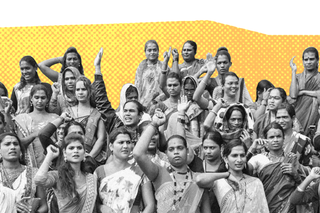
Union Govt to Offer Health Insurance Scheme for Trans Persons
The scheme will also cover sex reassignment surgeries, but currently requires people to present their gender certificates.

Through a press release issued on Wednesday evening, the Union Government announced a health scheme providing an insurance policy for transgender individuals. The Ministry of Social Justice and Empowerment signed a Memorandum of Understanding (MoU) with the National Health Authority under the Ministry of Health to extend the benefits of its existing Ayushman Bharat Scheme to trans people.
An existing scheme provides families with health insurance cover of up to five lakh rupees per year. For transgender people, this clause was tweaked to provide every individual transgender person an insurance cover of the same amount. The government highlighted that the scheme will enable trans persons to access over 50 different health facilities, and also announced that it would cover cosmetic surgery free of cost for those registered under it.
However, despite these benefits, bureaucratic and societal limitations may prevent its meaningful implementation.
The government’s own statements on the reach and eligibility criteria of the scheme hint at some limitations. For instance, the government said that it would tap into its database of 4.8 lakh transgender persons registered under the Social Justice Ministry to identify eligible beneficiaries of the scheme. This means that only those who hold official certification stating their trans identity will be able to access the scheme’s benefits. However, as Dr Aqsa Shaikh, a trans medical practitioner and activist, pointed out to the Indian Express, “The 4.8 lakh figure is as per the 2011 census and only 2 percent of this number have been issued the certificate by the Social Justice Ministry so far.”
Then, there’s the larger, more fundamental issue of self-determination.
Related on The Swaddle:
What a Transgender‑Friendly Health Care System Would Look Like
In 2014, the Supreme Court of India in a landmark judgment, affirmed the fundamental rights of trans people, and accorded to them the right to self-identify their own gender. Colloquially known as the NALSA Judgment, this verdict has been the cornerstone of trans rights in the country.
However, in 2019, the Government introduced the controversial Transgender Persons (Protection of Rights) Act, 2019 (Trans Act for short), which undermines the Supreme Court’s emphasis on the right to self-identification, and other aspects of the NALSA judgment. The Trans Act was framed by the Social Justice Ministry without any consultation with any transgender person or group; the trans community has consequently accused the Act of being transphobic and exclusionary.
Among other things, the legislation necessitates that a transgender person must apply to their District Magistrate for a certificate identifying their gender. In other words, the final say on any trans individual’s gender rests with the District Magistrate instead of the individual themselves. Moreover, in a society where transphobia is rampant and slotting people into a gender binary is the norm, a gender certificate can also lead to a wider scope of potential discrimination, and exclude non-binary individuals as well.
Beyond the issues with registration and identification of trans individuals as potential beneficiaries for the scheme, the government announcement also makes no mention of the institutional, infrastructural, and societal hurdles transgender people face in accessing healthcare in the country. For instance, while the scheme provides for free sex reassignment surgeries for trans individuals, in reality the situation with gender confirming surgery in India is quite grim. Transition surgery is a complicated process and there are few healthcare centres and medical professionals in India equipped to carry out the procedure. There are several instances of medical negligence leading to botched-up surgeries, which in occasional cases have also resulted in the death of the patient. Without addressing this fundamental issue at the infrastructural level, free sex reassignment surgeries will remain an empty promise.
Thus, the government must first address the bureaucratic and infrastructural barriers that prevent transgender individuals from accessing quality healthcare. The implementation of the insurance scheme can be meaningful only when transgender persons are confident enough to avail its benefits.
Amlan Sarkar is a staff writer at TheSwaddle. He writes about the intersection between pop culture and politics. You can reach him on Instagram @amlansarkr.
Related


How the Design of Our Cities Reflects Caste, Class Anxieties
